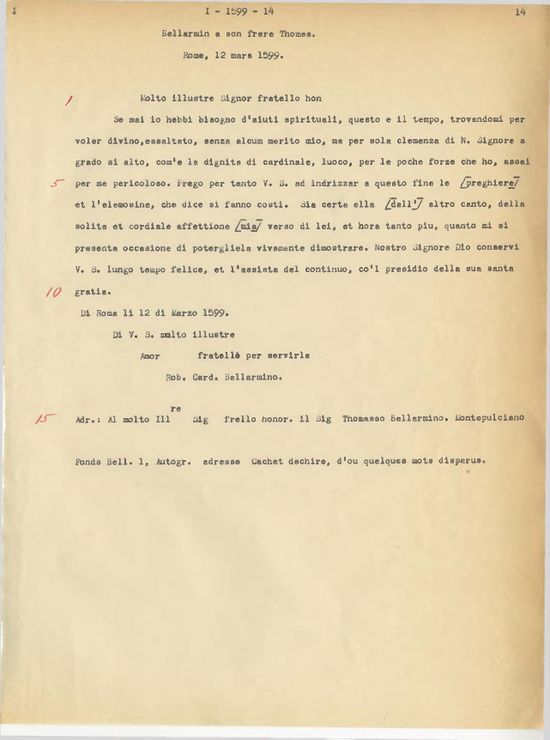Help:EBC Transcription guidelines
| These guidelines are valid for the transcription of the Epistolae Bellarmini Cardinalis only. To read other projects guidelines, please visit their respective pages. |
These guidelines are meant to transcibe letters within the Epistolae Bellarmini Cardinalis collection. These letters are typescript transcriptions made by several editors during about 70 years. The edition criteria used by these editors are not known, so texts here published may not always correspond to the original manuscripts.
Consequently, it has been decided to review the texts in order to ease the full-text search.
In these guidelines you will find not only the rules for transcribing, but also the descriptions of other tasks that users must complete, in order to guarantee the proper functioning of GATE and to ease the work of other users. These simple and quick tasks must be performed within the same page where you are transcribing the letters. Their main function is monitoring and keeping updated the whole progress of the work.
In any case remember that GATE is a collaborative project, therefore not all the tasks must be carried out by the same user.
These transcription guidelines are available in the following languages:
Transcription guidelines[edit]
Accent marks[edit]
When accent marks are absent in the typescript, they must be reported within the transcription, e.g.:
“virtu” → “virtù”;“umanita” → “umanità”- etc.
The same style is valid for other languages too (French, Latin etc.).
This choice implies the deletion of accent marks no longer used in modern languages, e.g. "mandarla à me" → "mandarla a me".
Abbreviations[edit]
Do not extend abbreviations of honorary titles and salutations. E.g., do not extend “P. C.”, “Ill.ma”, “card.” etc..
On the other hand, abbreviations of places, names or other entities that could be searched should be extended. e.g.
“Montep.no” → “Montepulciano”;“R.C.B.” → “Roberto Card. Bellarmino”;“R.a” → “Roma”.
This rule applies to any language.
In case of doubts in that regard, leave abbreviated words as they appear in the original text.
Spaces[edit]
Diacrital marks (including punctuation) are always followed by a space; this rule doesn't apply to apostrophes used in articles or prepositions, e.g.:
“ill.mo” NOT “ill. mo”;“V. S.” NOT “V.S.”;“l’altra” NOT “l’ altra”;“chiesa, casa” NOT “chiesa,casa”;“dell’altra” NOT “dell’ altra”.
Other normalisations[edit]
- Any further integration is allowed ONLY to return a more correct text, e.g. restoring concurrence between articles and words, e.g.
“dei numero” → “del numero”. - Outdated forms must be returned to the current use, e.g.
“haver” → "aver",“humanità” → "umanità",“Venetia” → "Venezia",“doppo” → "dopo",“colegio” → "collegio"etc..
Manuscript additions[edit]
Manuscript additions made by the editors which correct and improve the text must be directly added to the transcription. Since this is not an edition of original manuscripts, it is not necessary to point these additions out.
Other rules[edit]
- Transcribe ONLY the text of the letters, including opening and closing salutations and signature; do not transcribe the header used by the editors, the place of preservation or any other information added by the editors: all these data will be inserted in the Index page of the letter together with other metadata (this task is carried out by GATE administrators only).
- When at the end of the transcription the address is reported, transcribe it using the
<pb/>TEI tag before the transcription of the address (see TEI help for further information). - After the opening salutation, at the end of every paragraph and at the end of each line of the text of the closing salutation, you have to insert the
<lb/>TEI tag (see TEI help for further information). - Do not insert the
<lb/>TEI tag at the end of each line of the letter to reproduce the text distribution as it appears in the typescript. - Words on two lines (at end of one line and at the beginning of the following line) must be integrally transcribed, without any breaking sign; words on two pages must be integrally transcribed in the page where they begin.
- In case of letters composed of two or more pages, insert the
<pb/>TEI tag at end of the text of each page (excepting the last one).
Transcription example[edit]
Management tasks[edit]
To maintain work progress up to date, users must change the transcription status when they finish to proofread the texts.
For further information about proofread tools, see Wiki help#Proofread.
Change transcription status[edit]
- when you visit a page not yet proofread, chosen in the [[not proofread letters list, before the text beginning it contains the indication This page has not been proofread;
- this indication informs about the transcription status of that letter; this status is set by users using a toolbar at the bottom of the page in 'Edit' mode;
- when users end their corrections, before saving, they must assign to the page the Proofread status (marked in yellow);
- after setting the new status and saving the page, before the text beginning you can see the new indication This page has been proofread.
Change transcription status categories[edit]
When you are in 'Edit' mode within a not proofread page, before the text beginning (or at the end of it), you can read the code [[Category:EBC Not proofread]]. This code represents a category assigned to that page to group it with similar pages, in this case pages containing letters not yet proofread within the Epistolae Bellarmini Cardinalis Project; as any other category, it is shown at bottom of the page (see Wiki help#Categories for further information).
Once users ended their revisions, before saving, they must change this category to [[Category:EBC Proofread]]: this will allow to maintain the not proofread letters list up to date.
Before leaving the page, check if the new category is shown at the bottom of the page and if it is in blue, not red. If it is red, it means the code used is not correct. It is sufficient to write [[Category:EBC proofread]] (with lowercase p) to generate the error.


